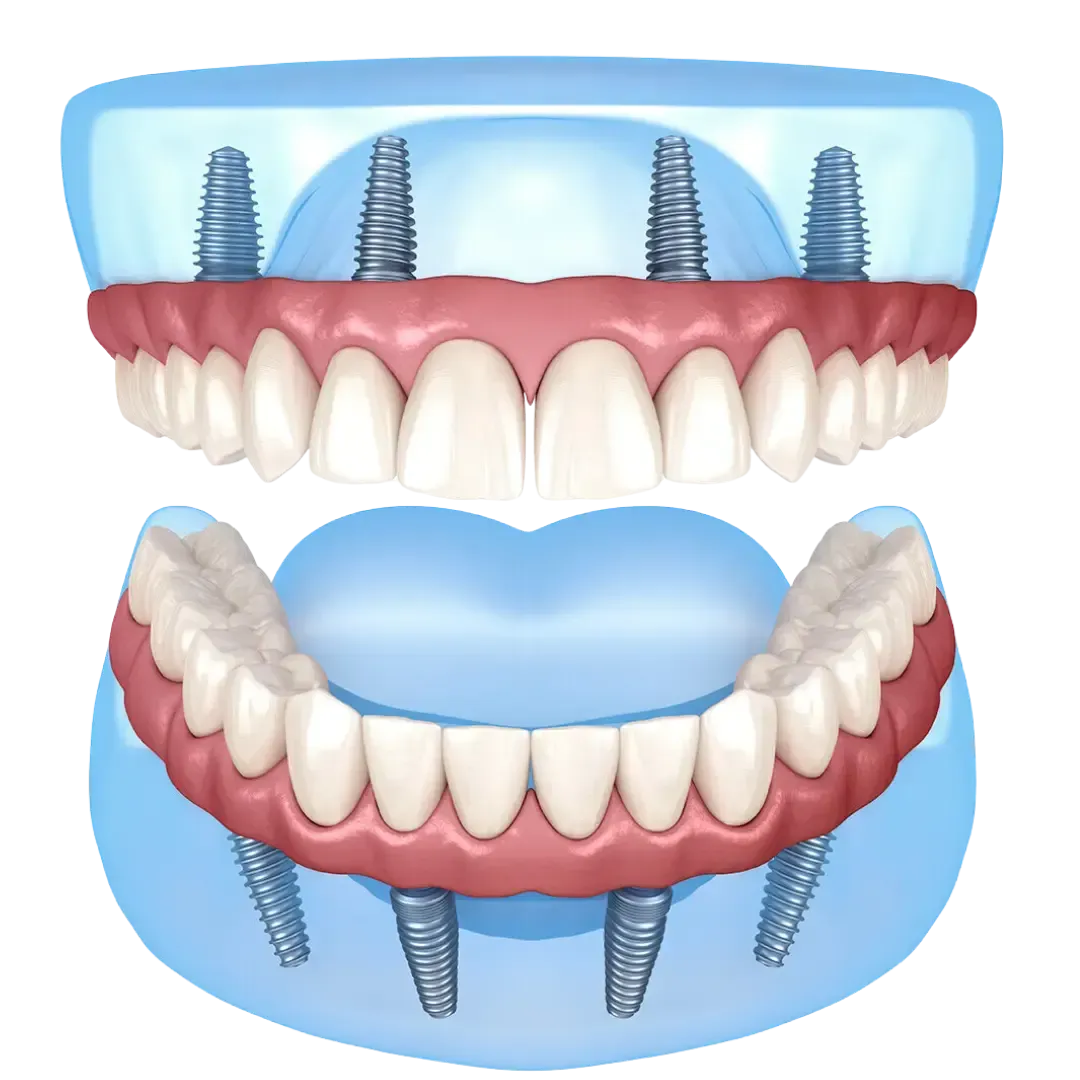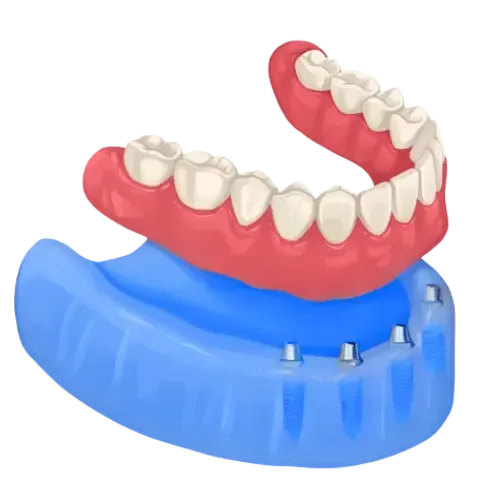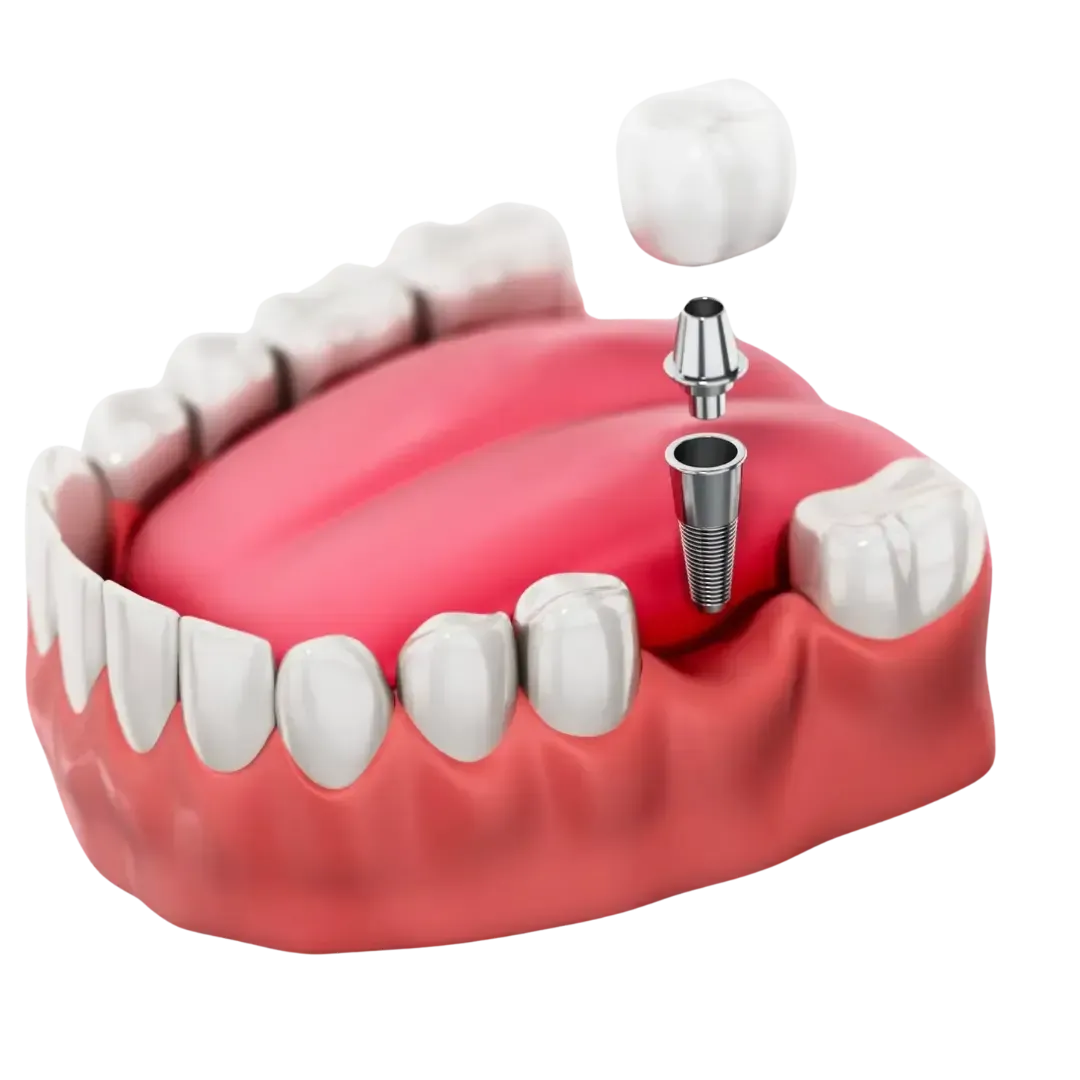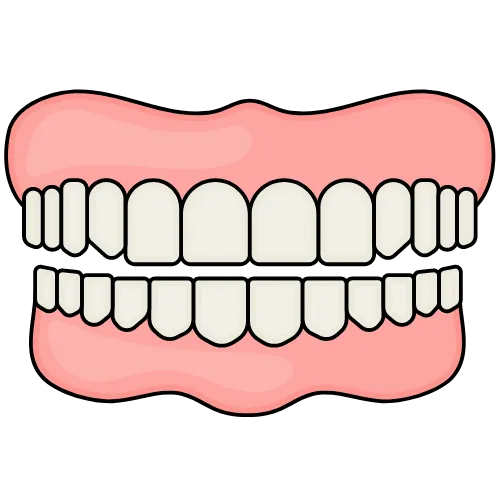2522 Yale St #210, Houston, TX
Dental Implant Frequently Asked Questions
We strive to answer all the questions you might have about Dental Implants.
Below are a list of our most frequently asked questions.
Dental Implant Frequently Asked Questions
We strive to answer all the questions you might have about Dental Implants.
Below are a list of our most frequently asked questions.
All-On-4 "Teeth in a Day" Frequently Asked Questions

Will I be able to eat with my new teeth from day one?
Yes! However, while your implants and teeth are securely placed from day one, we do ask that you maintain a soft diet during the healing period.
How long has the All-on-4 procedure been around?
This procedure was pioneered by Portuguese dentist Paolo Malo in the 1990s. Since then, this procedure has safely been performed on hundreds of thousands of patients.
How does Sapphire Smiles compare to other local dental offices?
We put you first and foremost and solely focus on your wellbeing and ensuring you have the greatest experience.
How frequently should professional cleaning be done for new teeth?
We recommend a professional cleaning and check-up every 6 months.
Is implant failure a possibility?
Although rare, implants can fail due to factors like smoking, diabetes, or poor bone integration.
Why am I experiencing increased saliva production?
Increased salivation is a temporary response to the new prosthesis in your mouth.
How long will bleeding last post-procedure?
Significant bleeding stops before leaving the clinic, but slight oozing may continue for a few days.
When is it safe to use a water flosser post-procedure?
It's advisable to wait for about 6 weeks after the procedure before using a water flosser for cleaning.
What should I prepare for post-procedure care?
It’s recommended to have ice packs, disposable washcloths, comfortable clothes, and soft foods ready for your post-procedure recovery.
What if I’ve been told I’m not a candidate for implants?
Many who’ve been told they're not candidates for traditional implants may still be suitable for the All-On-4 procedure, often without the need for extensive bone grafting.
Can the entire procedure really be done in one day?
Yes, it’s possible and preferable to complete extractions, implants, and fixed teeth placement in one day for optimal outcomes.
Are there financing options available?
Yes, we provide various payment and financing options to accommodate our patients’ needs.
How long does the entire procedure take?
The surgery typically takes about an hour per arch, with additional time for lab work and adjustments, completing mostly within a day.
Do All-On-4 teeth move or rock?
Your All-On-4 teeth should remain firmly in place, as they are securely attached to the implants.
Is it common for temporary teeth to be damaged?
Temporary teeth, being acrylic, can chip or break, but they are easily repairable.
Are the All-On-4 bridges removable?
The bridges are fixed and can only be removed by a dentist. They are designed to stay securely in place.
How much time off work is needed for recovery?
Recovery time is generally short, with most people returning to work within 4-7 days. The exact duration depends on individual recovery and adaptation to the new teeth.
How do I care for my All-On-4 teeth?
Just like we’re supposed to brush and floss natural teeth, we should do the same with our All-On-4 teeth and implants. A few minutes a day is all it will take to keep your mouth and implants healthy. Brushing your bridges with a soft bristle tooth brush and cleaning under them with a water flosser.
What do the new implant bridges feel like?
Your new implant bridges will be a new sensation and will take a few days or sometimes a few weeks to get used to.
Is there excessive pain involved in this procedure?
The pain is manageable, akin to that of dental extractions, and we ensure patient comfort with appropriate pain management methods.
Will I experience post-procedure pain?
Some discomfort and swelling are normal post-procedure, but many patients report minimal pain. Prescribed pain medication and possibly a steroid shot will help manage any discomfort.
What is the typical recovery duration for this procedure?
Recovery varies per individual, but generally, it’s quicker than other full arch replacement methods. Pain usually subsides within 1-2 weeks, with full healing in about 6 months.
Is sedation available for the procedure?
We provide oral sedation to ensure your comfort. It’s essential to arrange for a driver post-procedure due to the effects of the sedation.
Are bridges always attached on the same day?
In most cases, bridges are attached immediately. However, in certain instances involving bone quality, a temporary healing denture might be necessary before attaching the permanent bridge.
Will I be able to use my new teeth effortlessly right away?
Adapting to your new teeth may require some time and practice, but they are designed to be user-friendly and easier to adjust to compared to other full-arch replacements.
Is speaking with my new teeth easy?
Adjusting to speaking with your new teeth may take a little time, especially with certain sounds. Practice and patience will help you adapt quickly.
Am I too young for this procedure?
Age isn't a barrier; this procedure is suitable for adults of all ages. It can significantly enhance both physical and emotional well-being regardless of age.
What materials are used for the final teeth?
Your final bridges are crafted from zirconia, offering greater durability and resistance to staining compared to other materials.
What is the cost of the All-On-4 procedure?
Pricing can vary based on circumstance, but anywhere between $19000 to $25000 per arch.
How can teeth be fixed in a day when implants need time to heal?
The unique aspect of this procedure is the immediate splinting of implants with your new teeth, aiding stability and reducing micro-movements that can impede healing.
What about same-day final teeth offered by other clinics?
While immediate final teeth are convenient, they can pose challenges, especially if complications arise or if you're far from the clinic.
Why is it called 'teeth in a day' if the final teeth are received later?
The term 'teeth in a day' refers to receiving a functional temporary set on the day of surgery. The final set comes after the healing phase to ensure optimal fit and aesthetics.
What about the durability of permanent teeth?
Your permanent teeth, made of zirconia or nano-ceramic, are highly durable and unlikely to suffer damage under normal use.
Can existing implants be used for All-On-4?
Existing implants typically can't be used for All-On-4 due to specific positioning requirements and the need for bone reduction.
Snap-In Implant Dentures Frequently Asked Questions

How many implants will I need?
Typically, an upper implant denture demands a minimum of 4 implants, and a lower one needs at least 2 for adequate stability. More implants can provide better anchorage, especially in the lower jaw.
I’ve had dentures for a long time, can I still get implants?
Absolutely! We recommend a complimentary consultation, including a 3D jaw scan, to assess your eligibility for dental implants.
Will there be pain after the procedure?
Post-procedure, some level of discomfort and swelling is normal, though many patients report minimal pain.
Are implant dentures really secure?
Indeed, implant dentures offer superior stability compared to traditional dentures, with options to enhance retention further.
When can I have the palate (middle part that covers roof of mouth) removed from my denture?
Palate removal is feasible with your final denture, once the healing process and implant integration are complete.
What is alveoloplasty? Why is it important?
Alveoloplasty, a surgical contouring of the jawbone, is crucial for improving denture fit and comfort.
Why am I salivating so much?
Increased salivation is a typical response to new dentures and should diminish within a few days.
Can food get under my implant denture(s)?
It's common for food particles to get under any mouth prosthetic. Implant dentures, however, are easily removable for thorough cleaning.
What is a soft liner?
A soft liner acts as a cushion inside your denture, enhancing fit and comfort during the healing process.
What items should I have ready for after my procedure?
Prepare with ice packs, disposable washcloths, comfortable clothing, and soft foods to ensure a smooth recovery.
Will I know how to speak with my new teeth right away?
It might take a little time to adjust to speaking with your new dentures, particularly with certain sounds.
I can’t stand having the roof of my mouth covered. What are my options?
For those uncomfortable with palate coverage, the All-On-4 procedure is a viable alternative, allowing for the removal of the palate in most cases.
Can implants fail?
Although rare, implant failure can occur due to reasons like inadequate bone integration, smoking, or uncontrolled diabetes.
How much do implant dentures cost?
Cost can vary, for more accurate pricing give us a call or schedule a complimentary consult and 3D X-Ray.
Will I get to use my implants the same day they’re placed?
Immediate use of implants is not possible; a healing period of 4 to 6 months is essential for the implants to properly integrate with the bone.
Do you offer anesthesia?
While full sedation is not an option, we offer oral sedation. It's crucial to arrange transportation post-procedure as driving is not advised.
Can I remove the palate of the denture (roof of mouth)?
The possibility of palate removal depends on the implant distribution. It can enhance taste sensations and comfort for some patients.
How often will my implant inserts need to be changed?
Replacement of implant inserts generally occurs 1 to 2 times a year, depending on various factors like the number of implants and your usage habits.
What are tori?
Tori, benign bony growths in the mouth, may need to be removed for better denture fit, although they are not harmful.
How long will I bleed after the procedure?
Light bleeding or oozing is expected for a few days post-procedure.
How long should I take off work for recovery after my procedure?
Recovery time varies among patients. It's advisable to take a sufficient break for swelling and bruising to subside and to adjust to the new dentures.
Am I too young for this procedure?
Age is not a constraint for this procedure. It's quite common among younger adults and offers substantial benefits to overall health and confidence.
Once I have my implant teeth attached, will I know how to use them right away?
Adapting to new implant teeth might require some practice, but they are generally easier to get accustomed to than traditional dentures.
Will my dentures still rock?
Minimal rocking of the dentures is possible, especially with fewer implants in the lower jaw.
Are implant dentures removable?
Yes, the design of implant dentures allows for easy removal and cleaning, enhancing oral hygiene and convenience.
What is involved in maintenance of implant dentures?
Regular maintenance includes changing snap rings, cleaning implants, periodic denture re-fittings, and daily home care involving brushing the dentures and implants.
Single Tooth Implant & Bridges Frequently Asked Questions

Do I need an implant for each of my missing teeth?
This varies depending on individual circumstances. A personalized consultation is essential to determine the appropriate treatment plan.
How much do dental implants cost?
Pricing can vary - why not come in for a complimentary consult and X-Ray?
What kind of aftercare will I need to perform with my dental implants?
Dental implants should be cared for just like your natural teeth, including regular brushing, flossing, and dental check-ups.
Will it function and feel like a natural tooth?
Although it might feel slightly different, a dental implant functions effectively like a natural tooth.
What is the process for getting an implant?
The process entails implant insertion into the jawbone, followed by a period for bone integration, usually 4-6 months. Subsequent steps include dental impressions and tooth fabrication.
Do you offer anesthesia?
We do offer oral sedation to ease the procedure. A designated driver is required post-sedation.
Can you put a temporary crown or bridge on my implant the same day it’s placed?
Currently, we avoid placing temporary crowns or bridges immediately after implant placement to minimize stress on the implants during their integration phase.
Am I a candidate for dental implants?
The majority of individuals are suitable for dental implants. We recommend a consultation to assess your specific situation.
What do implant teeth look like?
Implant teeth closely resemble natural teeth in appearance and are not visibly distinguishable as the implant is positioned beneath the gum line.
How long should I take off work for recovery after my procedure?
Recovery time varies; most patients can resume work either the same day or the day after. Extended recovery may be necessary in certain scenarios.
Is my implant removable?
Once fully integrated and completed, the implant is not designed to be removable.
How long will I bleed after the procedure?
Minimal bleeding is expected during the initial 24 hours post-implantation.
Can implants fail?
Despite a high success rate, implant failure can occur due to factors like inadequate bone integration, smoking, or diabetes.
Dentures Frequently Asked Questions

What are immediate dentures?
Immediate dentures are fitted right after the extraction of natural teeth. They serve to manage swelling and bleeding, essentially acting as protective covers over the sites of extraction.
What is it like getting used to immediate dentures?
Acclimating to immediate dentures can differ from person to person. It requires time and adaptability, especially as the mouth adjusts during the initial 6 months of healing.
How do I chew with my new dentures?
Start by cutting food into small portions and chewing slowly, using both sides of the mouth evenly to balance the pressure on the dentures.
Should I take my dentures out when I sleep?
Removing dentures during sleep is advised to give the gums rest and allow for natural saliva circulation, extending the lifespan of the dentures.
Can my dentures be damaged?
Acrylic dentures are susceptible to damage if dropped on hard surfaces.
What are partial dentures?
Partial dentures are used to replace a segment of missing teeth in an arch, attaching to the remaining natural teeth for support and stability.
Are immediate dentures removable?
Yes, immediate dentures are designed to be removable. They primarily rely on natural suction or adhesive for retention, especially in cases where upper dentures lack natural suction.
What is the process for getting immediate dentures?
This procedure spans about 6 months. It involves pre-procedure impressions, crafting the dentures, placing them post-extraction, and applying a series of soft liners during healing. The process concludes with a final adjustment after 6 months.
How do dentures fit?
Denture fit varies depending on individual oral structures. Upper dentures typically achieve good fit through suction, whereas lower dentures might feel less stable due to tongue and cheek motion.
How do I care for my dentures?
Regular cleaning with antibacterial soap and a soft brush is recommended. When not in use, keep them in water to maintain their shape.
Can I boil my dentures?
Boiling is not recommended as it can warp the dentures, potentially necessitating replacement.
Will there be pain after the procedure?
Some discomfort and swelling might occur post-procedure, but it's often minimal.
What are full dentures?
Full dentures are prosthetic replacements for all teeth in either the upper or lower jaw, or both, designed to restore the full dental arch.
What are the advantages of dentures?
Dentures offer multiple benefits, including enhanced appearance, improved facial structure, better nutrition through effective chewing, cost-effectiveness, and overall improvement in quality of life.
Will I know how to eat with my new dentures right away?
Adjusting to eating with new dentures takes practice and patience. The adjustment period is essential for becoming proficient in using them effectively.
Hear How Dental Implants Have Transformed Lives

Dr. Antoun DDS - Expert In All Dental Implants
Dr. Antoun is a highly skilled and experienced dentist that primarily focuses on implant and cosmetic dentistry. He has completed countless Single, Snap On and All-On-Four Dental Implant Cases and has changed the lives of many people for the better.
Dr. Antoun’s passion for comprehensive dentistry keeps him immersed in multiple continuing education programs, and he’s demonstrated exceptional proficiency in the fields of oral surgery, prosthodontics, and restorative dentistry which has further enhanced his ability to perform complex implant procedures.
Trusted By Patients. Proven By Results.
Read Our Wonderful Reviews
See If You Are A Candidate By Completing The 30-Second Survey Below
Complete This Survey To
Find Out:
What Treatment Options Are Available
Financing Options and Pricing
If You Are A Candidate For Dental Implants
Secure Your Free Consult Today
Receive a FREE Implant Consult and CBCT X-Ray
This Office Does NOT Take Medicaid
March Limited Time Offer - FREE Implant Consultation ($580 Value)
Proudly Serving Communities Of:
Houston
Pasadena
Sugar Land
Pearland
Missouri City
Baytown
Galena Park
Bellaire
Humble
Friendswood
Deer Park
League City
Stafford
Channelview
Webster
Sapphire Smiles

